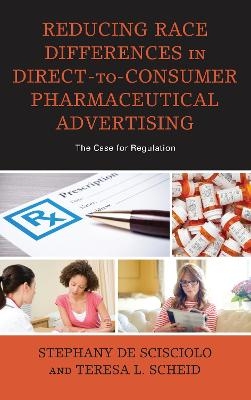
Reducing Race Differences in Direct-to-Consumer Pharmaceutical Advertising
The Case for Regulation
Seiten
2018
Lexington Books (Verlag)
978-1-4985-7416-7 (ISBN)
Lexington Books (Verlag)
978-1-4985-7416-7 (ISBN)
This book examines whether direct-to-consumer pharmaceutical advertising changed in response to recommendations made by the FDA in 2009 to enhance the informational and motivational value of advertising to be more accessible to minority populations and consequently work to reduce health disparities.
Reducing health disparities by increasing access to health information is a national health policy priority. Evidence exists that direct-to-consumer pharmaceutical advertising (DTCA) is effective in educating consumers about health issues. However, racial disparities exist in such advertising. In 2009, the Food and Drug Administration (FDA) issued a report that included recommendations for enhancing the ability of DTCA to reach disadvantaged populations, including racial and ethnic minorities. Reducing Race Differences in Direct to Consumer Pharmaceutical Advertising compares the pharmaceutical advertisements placed in five popular women’s magazines published prior to and following the 2009 FDA report to assess the impact of these recommendations on the content and appearance of advertisements placed in magazines of differing racial orientation. From a health policy perspective, the results are disappointing. The FDA recommendations had no impact on the frequency or content of the DTCA appearing in White-oriented versus Black-oriented magazines. In fact, far fewer drugs used to treat life-threatening conditions were advertised in Black-oriented magazines after the 2009 FDA recommendations. The book concludes that enhancing the educational and motivational value of DTCA will require more than a set of recommendations. The results shed light on the pharmaceutical industry’s compliance with both hard and soft regulation. Neither federal recommendations nor industry guidelines resulted in the changes to DTCA envisioned by the FDA. Regulatory action is necessary to ensure that pharmaceutical companies develop advertising campaigns that not only promote their products, but also positively impact the health outcomes of those who read their ads.
Reducing health disparities by increasing access to health information is a national health policy priority. Evidence exists that direct-to-consumer pharmaceutical advertising (DTCA) is effective in educating consumers about health issues. However, racial disparities exist in such advertising. In 2009, the Food and Drug Administration (FDA) issued a report that included recommendations for enhancing the ability of DTCA to reach disadvantaged populations, including racial and ethnic minorities. Reducing Race Differences in Direct to Consumer Pharmaceutical Advertising compares the pharmaceutical advertisements placed in five popular women’s magazines published prior to and following the 2009 FDA report to assess the impact of these recommendations on the content and appearance of advertisements placed in magazines of differing racial orientation. From a health policy perspective, the results are disappointing. The FDA recommendations had no impact on the frequency or content of the DTCA appearing in White-oriented versus Black-oriented magazines. In fact, far fewer drugs used to treat life-threatening conditions were advertised in Black-oriented magazines after the 2009 FDA recommendations. The book concludes that enhancing the educational and motivational value of DTCA will require more than a set of recommendations. The results shed light on the pharmaceutical industry’s compliance with both hard and soft regulation. Neither federal recommendations nor industry guidelines resulted in the changes to DTCA envisioned by the FDA. Regulatory action is necessary to ensure that pharmaceutical companies develop advertising campaigns that not only promote their products, but also positively impact the health outcomes of those who read their ads.
Stephany De Scisciolo is senior executive with a national nonprofit dedicated to improving the health and well-being of disadvantaged communities and those that live within them. Teresa L. Scheid is professor of sociology at the University of North Carolina at Charlotte.
Introduction: Health Disparities and Pharmaceutical Advertising
1. The Pharmaceutical Industry, Direct to Consumer Advertising, and Racial Differences
2. Direct to Consumer Advertising: Patient Empowerment or Manipulation?
3. Comparative Analysis of the Frequency and Type of DTCA
4. Differences in the Appearance and Content of DTCA
5. Examination of the Visual Content of DTCA
Conclusion: A Missed Opportunity: Policy Implications
| Erscheinungsdatum | 10.05.2021 |
|---|---|
| Verlagsort | Lanham, MD |
| Sprache | englisch |
| Maße | 159 x 231 mm |
| Gewicht | 404 g |
| Themenwelt | Sachbuch/Ratgeber ► Gesundheit / Leben / Psychologie |
| Recht / Steuern ► EU / Internationales Recht | |
| Recht / Steuern ► Privatrecht / Bürgerliches Recht ► Medizinrecht | |
| Sozialwissenschaften ► Soziologie | |
| ISBN-10 | 1-4985-7416-5 / 1498574165 |
| ISBN-13 | 978-1-4985-7416-7 / 9781498574167 |
| Zustand | Neuware |
| Haben Sie eine Frage zum Produkt? |
Mehr entdecken
aus dem Bereich
aus dem Bereich
Vorschriftensammlung
Buch | Softcover (2024)
C.F. Müller (Verlag)
CHF 76,95


